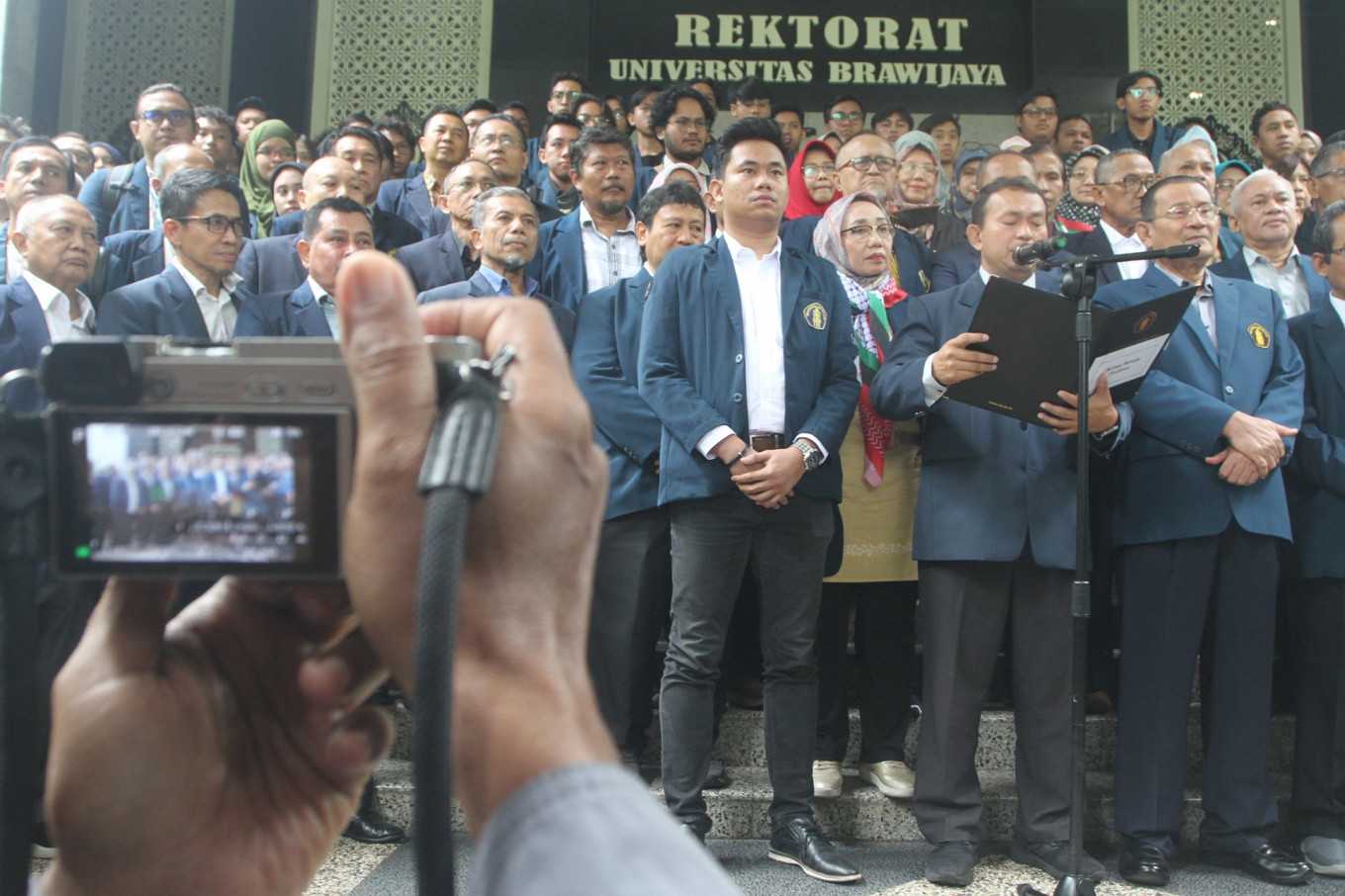Popular Reads
Top Results
Can't find what you're looking for?
View all search resultsPopular Reads
Top Results
Can't find what you're looking for?
View all search resultsFor everyone’s glory
State universities need to remember their public service imperative even as they pursue commercial viability, especially nowadays when higher education credentials no longer seem to be a strong guarantee for employment.
Change text size
Gift Premium Articles
to Anyone
 Students and professors of Brawijaya University deliver a speech at the university's campus in Malang, East Java, on Feb. 6, 2024. The university's professors and students urged the government to be impartial and push for fair law enforcement ahead and during the 2024 general election. (Antara/Ari Bowo Sucipto)
Students and professors of Brawijaya University deliver a speech at the university's campus in Malang, East Java, on Feb. 6, 2024. The university's professors and students urged the government to be impartial and push for fair law enforcement ahead and during the 2024 general election. (Antara/Ari Bowo Sucipto)
R
ecent discourse around the rising cost of state university tuition (UKT) has made it necessary to reexamine the execution of the Tri Dharma (three imperatives) of higher education: instruction, innovation and public service.
Over the past few weeks, state universities have faced sharp criticism from students for raising tuition fees with little transparency. In some cases, instead of offering an explanation, campuses have resorted to demonizing the very students who tried to speak up about it.
It did not take long for the government to get dragged into the debacle, given that this year’s state budget allocation for education, at Rp 665 trillion (US$41.2 billion), was the highest ever since a constitutional mandate for a minimum in state education spending was put forth in 2008.
Unfortunately, an education official fumbled the messaging by suggesting that the state views higher education as a “tertiary” need and that, because of this, it preferred to put the money toward developing mandatory primary education.
After listening to the students’ objections, House of Representatives lawmakers summoned Education, Culture, Research and Technology Minister Nadiem Makarim this week to demand the immediate suspension and review of provisions on incorporated state universities and their corresponding new tuition structures.
In particular, a recent ministerial regulation that Nadiem signed was seen as the spark that led to this big debate, at a time when universities are expected to better manage their finances – privatization being a common route.
However, Nadiem stood his ground and blamed public misperception as the source of this conundrum, rather than taking ownership of the fact that any tuition hike ought to be paired with tangible improvements in educational quality and outcomes so as to justify the increased costs.
At least he committed to screening the campuses and said he would suspend any predatory practices by universities that take advantage of economically disadvantaged potential students.
Vice President Ma’ruf Amin was at least willing to be honest about the government not being able to take on all of the financial costs of higher education.
Even then he argued that the burden of finances should not be passed onto students, especially as Indonesia hopes to produce highly skilled graduates to improve the abysmal national rate of tertiary-educated people that had “shocked” President Joko “Jokowi” Widodo in January.
It is easy to forget that the average length of school enrollment in Indonesia is around nine years as of 2022; that our students’ Program for International School Assessment (PISA) scores haven’t passed the 400-point threshold and that primary school-educated Indonesians still dominate the workforce, according to a Kompas daily investigation.
All of this serves to highlight how the dream of nurturing a “golden” generation by the nation’s first centenary still faces a myriad of challenges that can only be overcome if the state, education institutions and the public can work toward the 2045 vision in lockstep.
For starters, the government should be more transparent with education stakeholders and the general public about the requirements to achieve its Golden Indonesia 2045 vision.
Scholars have pointed to the need to have enterprising leaders at state universities so they are better equipped to manage their institutions by striking a balance between commercial success and principled patronage.
State universities need to remember their public service imperative even as they pursue commercial viability, especially nowadays when higher education credentials no longer seem to be a strong guarantee for employment.
On Thursday, president-elect Prabowo Subianto blamed the tuition hike on “unfettered neoliberal and capitalist credo” and even pledged to make college tuition-free. But not everyone can afford to be a patron like Prabowo, known for paying for people’s education out of his own pocket.
Yet perhaps it is useful to take another example, where 23 tycoons pledged Rp 23 billion (US$1.43 million) to our Under-23 national soccer team as motivation to join the Olympic Games.
We should treat our state universities more like our soccer team; what we invest won’t necessarily result in immediate gains, but may bring a sense of glory for the entire team.










